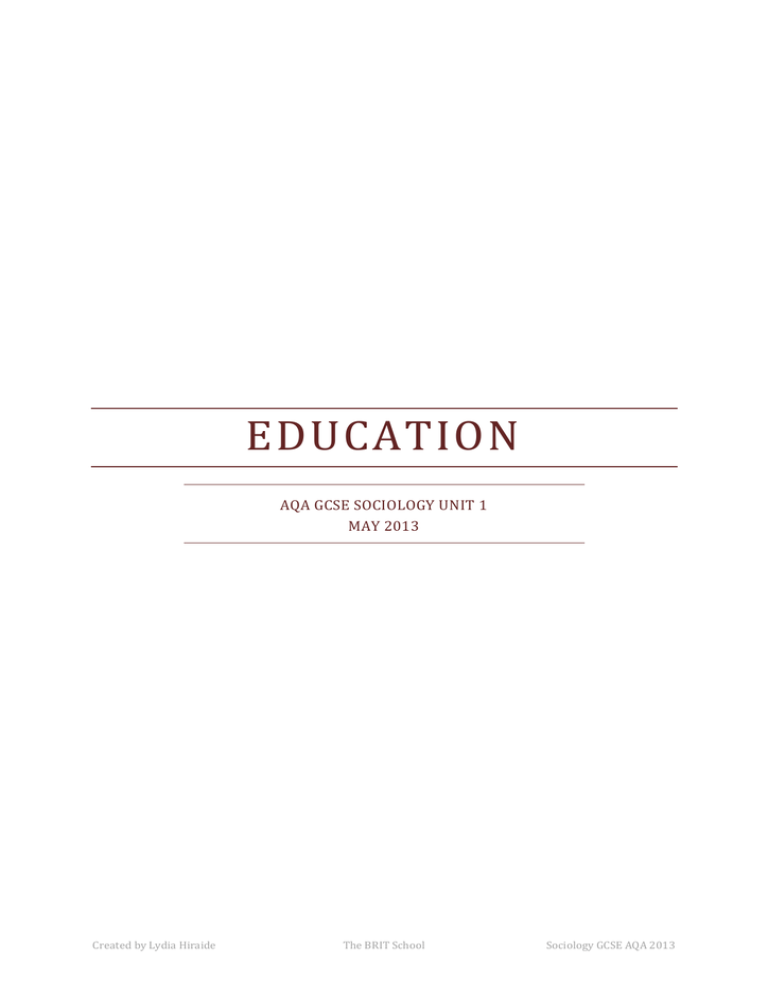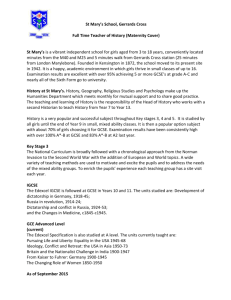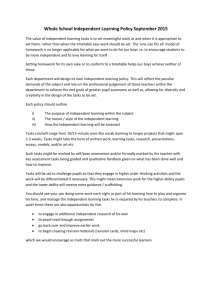education - Whitley Academy
advertisement

EDUCATION AQA GCSE SOCIOLOGY UNIT 1 MAY 2013 Created by Lydia Hiraide The BRIT School Sociology GCSE AQA 2013 THE ROLE OF EDUCATION Education involves building up knowledge and learning new skills. It can take place formally or informally. Formal education: takes place in educational institutions such as schools and universities where people learn knowledge and skills across a wide range of subjects. Informal education: takes place when people develop knowledge and skills by observing what is happening around them in everyday life. THE PURPOSES OF FORMAL EDUCATION Sociologists disagree about what formal education is for. FUNCTIONALIST VIEWS ON FORMAL EDUCATION The Functionalist approach focuses on the positive functions that the education system performs in society. These include: - - - Serving the needs of the economy: Education has an economic role in teaching the knowledge and skills that future workers will need in a competitive global economy Selection: The education system works like a sieve, grading people and allocating them to jobs based on their individual merit, abilities and exam results Facilitating social mobility: The education system is expected to enable individuals to move up/down the social ladder. Able students from disadvantaged backgrounds have opportunities to achieve qualifications that allow them to move up the layers of the social class system Encouraging ‘Britishness’ and social cohesion: Through their formal education, pupils identify with British culture and see themselves as British citizens. Schools help to reinforce the ‘glue’ or the social bonds that unite different people in society Secondary socialization: While at school, pupils learn the culture, norms and values of their society Social control: Schools teach pupils to conform and accept rules and adult authority MARXIST VIEWS ON FORMAL EDUCATION The Marxist approach is crucial of the role of the education system in capitalist society. This approach sees the education system as benefiting privileged groups and reinforcing social inequalities over time. Their beliefs include - - Serving the interests of the ruling class: By passing on ideas and beliefs that benefit the ruling class (e.g. that the capitalist society is fair and meritocratic) Reproducing the class system: Education appears to reward pupils fairly based on their individual abilities. However, it actually favours pupils from more advantaged backgrounds. Over time, education reproduces the advantages that some social class groups have over others. Breeding competition: Through sports and exams at school, students are encouraged to accept values such as competition. If most people value competition, this helps to maintain the capitalist system because it is based on competition. Created by Lydia Hiraide The BRIT School Sociology GCSE AQA 2013 - Secondary socialization: The education system socializes working-class children to accept their lower position in capitalist society. They learn to accept hierarchy at school and to obey rules. KEYWORDS - - - - - Capitalism: An economic system in which private owners invest money – or capital – in businesses in order to make a profit. Function: The role that a social structure such as the family or the education system fulfils on behalf of individuals or society. Functionalist approach: A sociological approach which examines society’s structures (such as the family, education system and religion) in terms of the functions they perform for the continuation of society and for individuals. Hidden curriculum: Things learnt in schools that are not formally taught such as valuing punctuality or obedience. Hierarchy: A hierarchy is shaped like a layered pyramid and each layer has more power than the one below it. In schools, for example, the head teacher is typically at the top of the hierarchy and the pupils are at the bottom. Marxist approach: A sociological approach that draws on the ideas of Karl Marx and applies them to modern societies. Meritocracy: A system in which an individual’s social position is achieved on the basis of their abilities and talents rather than on the basis of their social origins and background. Official curriculum: The formal learning that takes place in schools, e.g. during history and science lessons. Social class: A group of people sharing a similar economic position in terms of occupation, income and wealth. Social cohesion: When a society is based on social cohesion, the different individuals and groups that make up society are united into a body of citizens rather than divided by conflicting interests. Social inequalities: The uneven distribution of resources (such as income and power) or opportunities and outcomes related to, for example, education and health. Social mobility: Movement up and down between the layers/strata of society. THE STRUCTURE OF THE EDUCATION SYSTEM The education system is structured into five different stages. 1. 2. 3. 4. 5. Preschool/early years education Primary education Secondary education Further education Higher education Created by Lydia Hiraide The BRIT School Sociology GCSE AQA 2013 EDUCATION AS A POLITICAL ISSUES Most recent governments have aimed to improve educational standards and have introduced reforms to raise standards. Critics often question how far government policies have actually achieved their aims. For example, the Education Reform Act 1988 SATs tests for 7-, 11- and 14year olds as a way of measuring pupils’ performance against national targets. Critics argued, however, that there was too much formal testing in schools. It has now been abolished. Many pupils found the tests stressful and some parents kept their children off school on test days. DEBATES ABOUT THE STRUCTURE OF EDUCATION Debates about how education is organized focus on issues such as the merits of: - Different types of school such as faith schools, private schools, special schools and selective schools Testing in primary schools Alternative forms of educational provision such as home education Special schools and mainstream schools FAITH SCHOOLS Some parents/carers want their children to attend a faith school. Others want their children to attend community schools that admit pupils regardless of their religious beliefs. ADVANTAGES & DISADVANTAGES OF FAITH SCHOOLS… Advantages: - Faith schools provide an education that complements the pupils’ religion Many faith schools have above average exam results Parents may prefer the religious ethos and teaching in a faith school Some supporters argue that faith schools produce individuals who have a strong sense of identity and self worth Disadvantages: - Faith schools segregate/divide children from different religions and discourage mixing They work against social cohesion The intake of many faith schools is not representative of the local population Some may discriminate in their employment or promotion of staff on religious grounds Created by Lydia Hiraide The BRIT School Sociology GCSE AQA 2013 PRIVATE SCHOOLS ADVANTAGES & DISADVANTAGES OF PRIVATE SCHOOLS… Advantages: - Private schools have an academic ethos and pupils tend to achieve exam results that are well above the national average They offer good teaching and learning resources and small classes They offer a wide range of extra-curricular activities There is a strong focus on careers guidance and progression to university Disadvantages: - Private schools are selective and only admit pupils who pass an entrance exam and/or whose parents can afford the school fees They tend to recruit pupils from similar backgrounds and help to reproduce social inequality and class divisions They can put pupils under a lot of pressure to compete and to perform well academically Many of the teachers in private schools have been trained at the state’s expense KEYWORDS - Marketisation of education: The policy of bringing market forces (such as competition) into education. Selective education: A way of recruiting pupils to a school, based on a form of selection. For example, pupils may be selected on the basis of their performance in an entrance exam or their parents’ ability to pay annual school fees. DIFFERENTIAL EDUCATIONAL ACHIEVEMENT This term refers to the variations in educational attainment between students according to their social class background, gender and ethnicity. PATTERNS OF EDUCATIONAL ACHIEVEMENT Be aware that: • • • In general, students from middle-class backgrounds tend to achieve better results in public examinations than those from working-class backgrounds Generally, students from some minority ethnic groups (such as Chinese, Indian and Irish heritage students) tend to perform better than others (such as African, Caribbean, Pakistani and Bangladeshi heritage students) within education During the 1970s and 80s, subject choice was gendered with girls and boys tending to specialize in different secondary-school subjects. In the sciences, girls tended to choose biology while boys tended to choose physics. This could be seen at ‘O’ level when more Created by Lydia Hiraide The BRIT School Sociology GCSE AQA 2013 • • boys sat exams in subjects such as physics and mathematics, and more girls sat exams in biology and English Language Traditionally, boys got better results at A-level than girls. However, towards the end of the ‘80s this gender gap in achievement began to narrow and by the early 2000s, girls were doing better than boys at GCSE and A-level. They were also tending to perform better in key stage tests. In 2008, girls performed better than boys in English and science tests at Key Stage 2 Not all students who are working-class, male, or from an ethnic minority background underachieve. For example, boys from schools in very affluent areas generally perform better than boys and girls in very deprived areas; middle-class boys tend to achieve better results than working-class girls INFLUENCES ON EDUCATIONAL ACHIEVEMENT HOME FACTORS Children’s experiences in the home and neighbourhood… • • • • Parental values and expectations o Parents in professional occupations often have high expectations of their kids and expect them to do well at school. They are more likely than other parents to monitor their children’s school performance. Parents’ educational backgrounds o If parents have high-level educational qualifications, they are more able to help with homework and monitor progress. Economic Circumstances o Students from relatively well-off backgrounds are more likely to have access to facilities to help them study at home o Students from some minority ethnic backgrounds are far more likely than white British students to attend the most deprived schools Cultural Background o Research suggests that British Chinese parents value education and that in Chinese culture, children respect older people. So British Chinese pupils develop high educational ambitions and get positive self-esteem from being ‘good pupils’ SCHOOL FACTORS Children’s experiences at school… • • • School-based resources o School factors include how well-resourced the school is The school curriculum o The school curriculum can be seen as ethnocentric; biased towards white European cultures. Critics argue that African Caribbean cultures, histories and experiences should be included more in the curriculum Teacher expectations and labeling o Some teachers may have lower expectations of students from working-class or minority ethnic backgrounds. This may affect how much attention such teachers give to these students during lessons and they may become demotivated o Negative labeling of working-class or ethnic minority background students can lead to a self-fulfilling prophecy. This means that students perform as badly or as well as their teachers expect them to Created by Lydia Hiraide The BRIT School Sociology GCSE AQA 2013 • Pupil cultures and school ethos o Some pupils may experience peer pressure to conform to the norms of a culture that does not value education o ‘Laddish’ cultures emphasize that it is ‘uncool’ to work hard. This informal peer subculture may encourage anti-learning attitudes and affect the progress of particular students o Among schools in middle-class neighborhoods, boys may not see education as ‘uncool’. They may achieve status among their peers by displaying academic abilities o School ethos refers to the character/culture of a school. Some schools have an academic ethos that promotes exam success and progression to higher education (e.g. selective schools) GOVERNMENT POLICIES The impact of government policies and reforms… • • • • • EMAs o Education Maintenance Allowances were introduced so that students from lowincome backgrounds could get financial help if they stayed on within education and training after GCSEs Equal opportunities policies and legislation o Equal opportunities policies and anti-discrimination legislation made it illegal for schools to discriminate on the basis of gender or ethnicity The specialist schools programme o Research suggests that some government policies such as this have helped to tackle low achievement and raise standards in schools Schools’ admission policies o Some policies can work against students from disadvantaged backgrounds. For example, if school’s admissions policy gives it scope to select its intake, this can work against students from disadvantaged backgrounds Marketisation, competition and league tables o The emphasis on parental choice/competition between schools to raise standards have made life more difficult for some urban schools that have an intake of working-class or minority ethnic students o National league tables were introduced to help raise standards in schools. However, they can have negative effects for low achievers from disadvantaged backgrounds if schools focus their resources on the better performers rather than on those who are not entered for GCSE exams KEYWORDS - - Institutional racism: This occurs when an organization (such as a police force or hospital) fails to provide an appropriate service to people because of their ethnic origin, culture or colour. Institutional racism can be seen in organizational attitudes or behavior that discriminates, even when individuals themselves act without intending this Labelling: The process of attaching a label to individuals or groups Minority ethnic group: An ethnic group that is in a minority in a particular society. Britain is home to many minority ethnic groups including those of Irish, Polish, Greek Cypriot, Indian and African Caribbean heritage Created by Lydia Hiraide The BRIT School Sociology GCSE AQA 2013 - - School ethos: This refers to the culture and character of a particular school. For example, selective schools have an academic culture that stresses the importance of exam success and progression from school to uni Self-fulfilling prophecy: This occurs when a teacher makes a prophecy/prediction about a pupil’s likely performance or potential that becomes true Streaming: A form of teaching in which students are grouped according to their general ability and then taught in this group for all of their subjects Selective education: A way of recruiting pupils to a school, based on a form of selection. For example, pupils may be selected on the basis of their results in an entrance exam, or on the basis of their parents’ or guardians’ ability and willingness to pay annual school fees FEMALE EDUCATION SINCE THE 1980S EQUAL OPPORTUNITIES POLICIES IN EDUCATION During the 1908s, many schools developed equal opportunities policies to try to address gender inequalities and discrimination in schools. This raised awareness of gender issues in education. ANTI-DISCRIMINATION LAWS Legislations such as the Sex Discrimination Act 1975 meant that schools could no longer discriminate on the basis of gender. Practices such as lining up girls and boys separately and having separate lists of girls’ and boys’ names on school registers were phased out. IMPACT OF FEMINISM Attitudes to gender roles generally and to girls’ education in particular have changed. Girls are no longer expected to see marriage and motherhood as their main goals in life. NATIONAL CURRICULUM Before the introduction of the National Curriculum, girls tended to specialize in some subjects and boys in others at 14 and beyond. The introduction of the National Curriculum in the late 1980s meant that pupils could no longer opt out of science subjects at 14. This helped to raise girls’ achievements in science and opened up career opportunities for females. EXAMPLE EXAM QUESTIONS 1. Identify and explain one way in which peer groups may influence pupils’ educational achievements. (4 marks) 2. Explain what sociologists mean by ‘institutional racism’. (4 marks) 3. Identify two reasons why some parents may want their children to be educated at home rather than at school. (2 marks) 4. Describe one way in which British governments have increased the use of testing in primary schools over the past 25 years and explain the criticisms of this policy. (5 marks) Created by Lydia Hiraide The BRIT School Sociology GCSE AQA 2013






